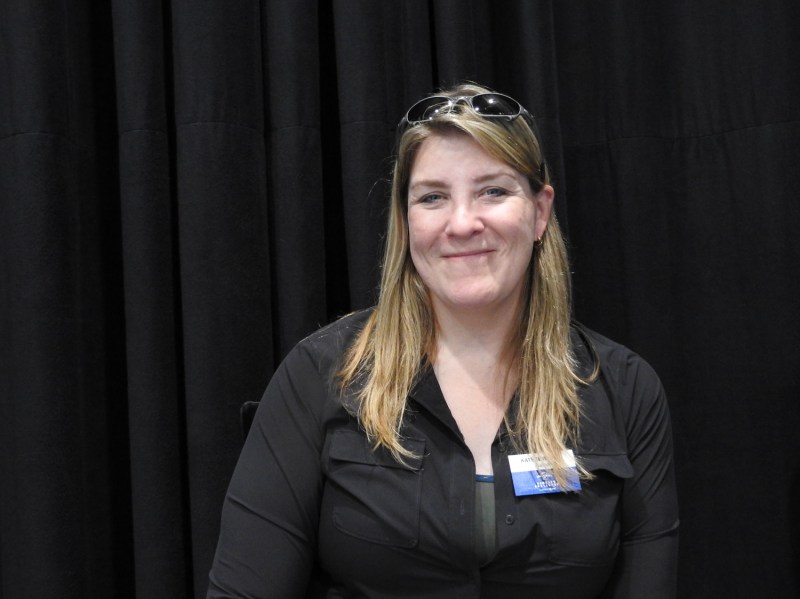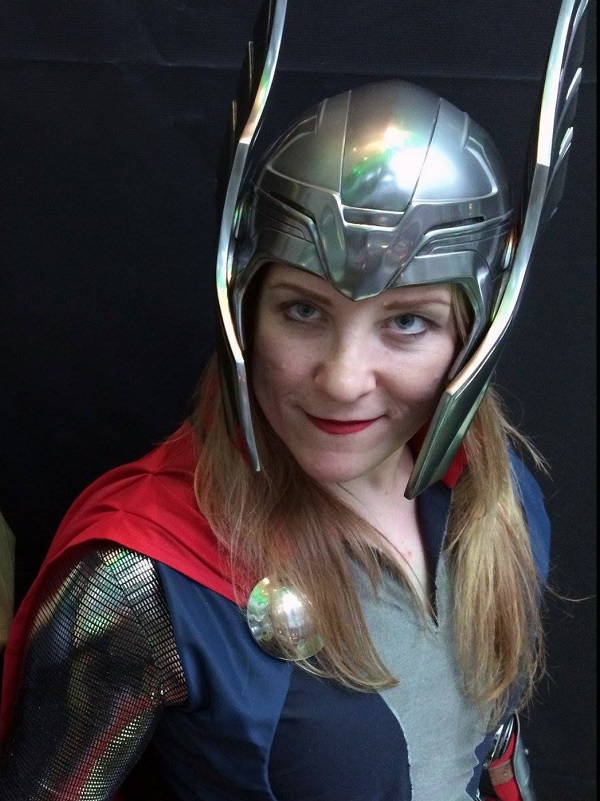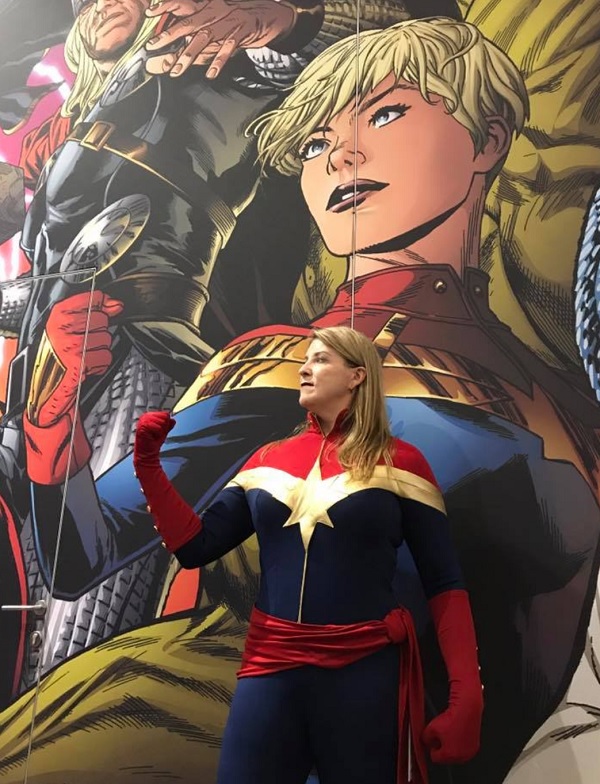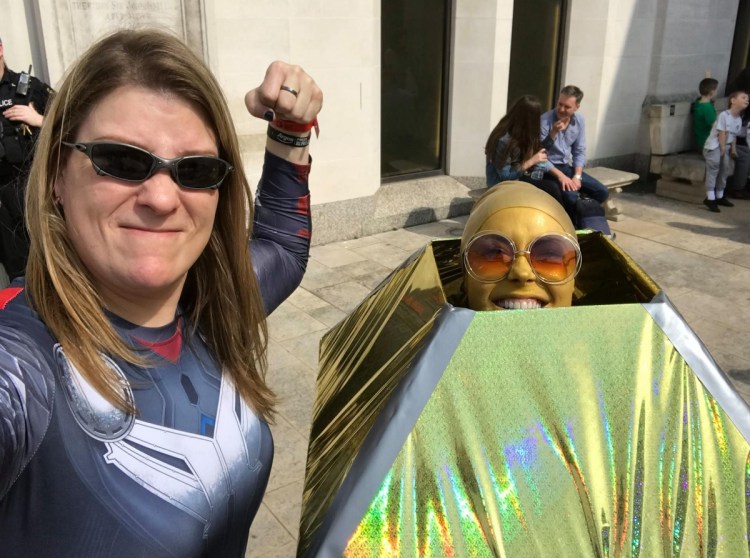Kate Edwards was very outspoken as the executive director of the International Game Developers Association. After five years in that job, she left in June 2017. And she’s still outspoken.
In fact, Edwards can talk about more issues now than she could while she worked for the IGDA, which represents the interests of game developers and now counts Jen MacLean as its leader. While at the IGDA, Edwards spoke out against Gamergate, the angry gamer movement, at great personal risk, and she documented crunch time, or forcing developers to work unpaid overtime, in the game industry.
She is CEO at Geogrify, providing geocultural and geopolitical content advice to game companies. And she is a board member at Take This, which helps game developers deal with mental health issues.
Edwards has traveled the world, giving speeches in places like Tehran, Iran, and Stockholm, Sweden. She’s also one of the most dedicated cosplayers in the gaming world, as you can see from the pictures. She has rare insights into game development around the world.
She’s at San Diego Comic-Con International now, but I talked to her during a recent visit to Hollywood at Universal Studios. We talked about her life post-IGDA, ageism in game development, the ArenaNet controversy where two writers were fired for arguing with fans, WHO’s declaration of gaming as a possible addiction, her belief that a union or legal defense fund should be created for developers, crunch time, and variety of other game developer topics.
Here’s an edited transcript of our interview.

Above: Kate Edwards is CEO of Geogrify and a board member at Take This.
GamesBeat: I still detect, from your social media, that you’re saying a lot of the same things you said while you were executive director at IGDA. It seems like it’s ingrained.
Kate Edwards: I think it is. A lot of people may have misunderstood why I took the IGDA role in the first place. It’s not that the role came along and then I became an advocate. I had already grown this desire to make this a better place as an industry. Because I’d already been involved in the IGDA for many years before I took the executive director role, I thought, “Okay, maybe this will be the tool I can use to make change happen.” That’s why, when they asked me to interview for the role, I gladly said yes, and when they offered it, I said yes again. I was really in that mindset.
I still do my culturalization work on the side because it’s my passion. It’s what I love to do. But advocacy has become a stronger passion. I had it before I took the IGDA role. The IGDA role amplified it to a great degree. And now, having left, I saw doing that work for five years as a means to an end. I could test the waters of advocacy, see if we could make things happen, and understand how we can and cannot make change happen. I walked away from that experience with wisdom about what we can do next.
GamesBeat: Do you feel more free now to talk about things that you’re passionate about? More than you were able to at the IGDA?
Edwards: Yes. I can now say and do anything I want. [Laughs] That’s why my gameadvocacy.org site — it’s my style of advocacy, which others have described as aggressive and blunt. In my observation, being in the industry so long, especially when I was running the IGDA, that’s what this industry needs right now. Change is not happening fast enough.
GamesBeat: Part of that was the ageism issue. You came up with a list that looked like it represented a lot of work.

Above: Watch out for Kate Edwards’ hammer.
Edwards: Yes. It’s funny, because that was done very much on a whim. I’d been mulling it over for a while. Why don’t we have a list like this? The 50-over-50 list. I’d been thinking about it for a while, but then it was just earlier this year, on a whim — I guess maybe it was the fact that I was then living in the Netherlands. I had a chance to refocus some of my work priorities. That happens when you change location. I decided to go ahead and do it. I wrote up the Google form to ask for nominations, and on Monday I dropped it out into the community as far and wide as I could.
Immediately the response was overwhelming. “This is awesome, this is great, this is so cool.” I left it open for about five weeks, if I’m not mistaken. I got more than 200 nominations before I closed it off. Originally my plan was to present it at GDC, but I was so busy at GDC with various obligations, still being on the committee for the advocacy track and all that — I collected the information, and then I got super busy in my travels and working in the Netherlands.
I sat on it for a while until I got to a point where people said, “Hey, whatever happened to that list?” Then E3 was coming up, and that was a perfect opportunity, another nice punctuated media wave to catch. That’s when I decided to release it. I went through the process of taking all the names suggested, ranking them by the number of nominations they received, and doing a simple cutoff at 50 people.
GamesBeat: Some people wanted to be on the list and weren’t on it.
Edwards: [Laughs] Of course a lot of the feedback I got was, “Hey, where’s the 40-over 40? Where’s the 60 over 60?” All these others. Many were joking. Some were not so joking. I also did get several contacts in private saying, “Why am I not on this list? I’m famous.”
GamesBeat: Did you get any people who said they didn’t want to be on the list?
Edwards: That’s actually a great point. When I had discussions with some people about this list, after I’d collected the names — somebody suggested, “Why don’t you ask them first?” I was on the fence. Some people said, “Just release it. Nobody asks the 30 under 30.” But it’s different. It is a different issue for people who are older in the industry, to be outed, so to speak, as being “old.” I thought it was a fair thing. I felt I’d rather be safe than sorry, so I contacted everyone on the list to see if they were okay with this. Overwhelmingly, everyone — not a single person said no. They all said, “I’m so honored, yes, please include me.”
GamesBeat: It felt like an issue that hadn’t been tackled so much. People haven’t necessarily put this at the forefront of things they’re concerned about.
Edwards: No, I don’t think so. It’s one of many issues that have been discussed in the industry for many years, but it is becoming more prevalent, at least in my experience in the last decade or so, because the work population is aging. Our industry hasn’t been around that long, but it’s been around long enough to where we do have a lot of people in their 50s and 60s who are still working, or trying to work, in the industry.
I’ve heard countless anecdotal stories of people, even in their late 30s, who have a very difficult time finding work. After a while they wonder if it’s their age. They have amazing credentials, a lot of experience on multiple franchise, but for some reason they can’t land a job. Even when I was running the IGDA, when I gave advocacy-focused lectures, I would tell people — we’re so focused on sexism, and for good reason, because of Gamergate and everything else that happened, and now the #MeToo movement, but ageism is really close behind that.
It’s the one that tends to be a bit more silent. That’s why when — 2015 is when I turned 50. At the IGDA party we did, that was exactly a week after my birthday. I decided to defer my birthday and hold that party at the IGDA party during GDC. I made a point of telling people, “I’m celebrating that I’m 50 and I’m not ashamed to say it.” But then of course I would joke with people that I’m doubly screwed in the industry now, because I’m both a woman and over 50. As a joke, obviously. It’s not a universal reality, but it’s a reality for some people.

Above: Kate Edwards as Captain Marvel.
GamesBeat: Mental health became a bigger issue as well.
Edwards: Absolutely. In the five years I ran the IGDA I was in a very unique position to interface with so many people, literally thousands of developers worldwide. Government officials, companies, educators, all of the game development ecosystem around the world. But on the developer side, both in the traditional studio system and the indies, mental health issues came up all the time. It was one of the main concerns that came up, or it was often a subtext to other problems.
I had already started the collaboration between Take This and the IGDA when I was still executive director. We released that white paper called “Crunch Hurts” in October 2016 to talk about the physical and mental impact of crunch on developers. Take This was a fantastic partner to make that happen. They came up with a lot of the great medical data in that white paper.
After I left IGDA, Russ Pitts, the creator of Take This, approached me and asked if I would like to be on the board. I immediately said yes, because I love what they do. I think it’s really important. Then I served a brief time earlier this year as interim executive director, when Russ felt like he needed to step out for a while. I filled in for a bit, and now Eve Crevoshay is an awesome executive director at Take This.
I’m happy to support the org, because I do feel that — especially with younger people in the industry, especially with indies, the impact of depression and anxiety and the pressures of releasing a game and dealing with the conflict between your internal creative process and all the external forces of what it takes to make a game, it’s very stressful.
GamesBeat: Just in time for Mike Gallagher to say crunch hasn’t been a problem for 10 years and for the WHO to consider video games a possible addiction.
Edwards: Exactly. Like many people, I’ve been very involved in those discussions. The WHO one was — it was interesting that they took this approach, but — I was the interim ED of Take This at the time. I turned automatically to our clinical director and asked, “What do you think?” He deals with people who deal with all kinds of issues — both in the industry and on the gamer side — all the time. I asked what our response should be. Of course, my gut reaction as someone from the industry is that this is total BS, but we have to keep an open mind about it.
His reaction, as we had several discussions — he said, “My gut sense is that it’s not really a disorder in the clinical sense. But we honestly don’t have enough research to prove either way.” That was the response we issued. We think that the WHO’s declaration is way too premature. We need a better call for research. That was counter to some other voices — for example, some major trade associations out there — who were saying that it’s ridiculous and there’s no proof at all. I think we need to be honest with ourselves. Do we truly, at this point in the evolution of games as a medium, understand every potential impact that it has? I’d say no, we don’t. There isn’t enough research.
GamesBeat: I was of the mind that you can be addicted to anything you’re passionate about. Why pick on video games?
Edwards: That was part of our take as well. Any form of media can be an addiction. I know people who binge watch. Media can trigger certain behaviors in human beings. It’s not just games. Even the whole issue about violence in games. Do games cause violence? I’d vehemently say no. Games don’t cause violence. Do games bring out violent tendencies that might already exist in someone? Potentially. But so can film. So can television. All these other forms could bring that out.

